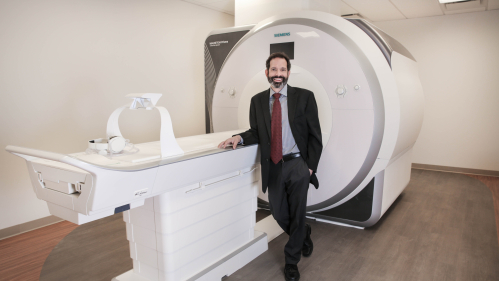Rutgers Opens Center for Advanced Human Brain Imaging Research

Researchers seek to improve diagnosis of neurological and psychiatric disorders
Rutgers Biomedical and Health Sciences has opened a new brain imaging research center to improve the diagnosis of neurological and psychiatric disorders and to help personalize and monitor treatments.
The Rutgers Center for Advanced Human Brain Imaging Research, part of the Rutgers Brain Health Institute, will make it possible to develop novel therapies for neuropsychiatric and neurological disorders, including addiction, schizophrenia, anxiety, depression, autism, brain injury, stroke and Parkinson’s and Alzheimer’s diseases.
“It will play a key role in rapidly moving discoveries made by neuroscientists in basic science labs into the clinic for the benefit of patients,” said Gary Aston-Jones, director of the Brain Health Institute.
The center includes a state of the art, research-dedicated 3T Siemens MAGNETOM Prisma Magnetic Resonance Imaging (MRI) scanner. The device measures structure and activity of the brain by assessing different properties of the brain, such as changes in blood flow, oxygen consumption and glucose use.
The MRI core facility will support research of faculty and trainees at Rutgers University, Rutgers Biomedical and Health Sciences, the Brain Health Institute and the Center for Computational Cognitive Neuropsychiatry. It is also available to work with pharmaceutical companies in the design and execution of research studies.
It will build on Rutgers’ existing strengths in neurodevelopment and neurodegeneration, affective and sensory neuroscience, and cognitive science research.
The new center will be led by David Zald, a professor of psychiatry at Rutgers Robert Wood Johnson Medical School, and an international leader in human brain imaging who has conducted pioneering work in how the brain processes emotional stimuli and regulates emotions. His research uses a combination of MRI and positron emission tomography imaging to examine the links between individual differences in brain structure and function and the risk for, and expression of, psychopathology. His work also examines how parts of the central nervous system are the foundations for specific behavior, cognitive process or psychological state of mental health disorders, specifically those that cross the boundaries of different psychiatric disorders.
“An advantage of the new center is that we have access to unique medical expertise due to our association with Rutgers Robert Wood Johnson Medical School and Robert Wood Johnson University Hospital. This allows our researchers to work with a range of clinical populations, which are not always as accessible at other facilities in the state,” Zald said.


